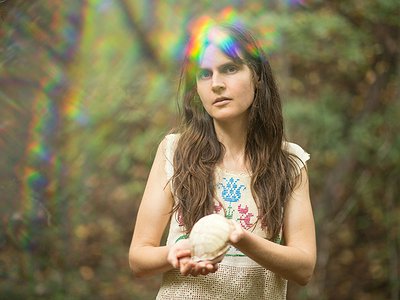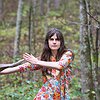Name: Sarah Louise
Nationality: American
Occupation: Guitarist, Composer, Songwriter, Sound Artist
Current Release: Nighttime Birds and Morning Stars on Thrill Jockey
Musical Recommendations: Journey in Satchidanada by Alice Coltrane
Pilgrim at Tinker Creek by Annie Dillard
If you enjoyed this interview with Sarah Louise, make sure to visit her bandcamp page and facebook account for more music, news and information.
When did you start writing/producing music - and what or who were your early passions and influences? What what is about music and/or sound that drew you to it?
Music is so intimate because it actually enters our bodies. It is the language of emotion and ritual, tapping into the most ancient parts of being human. I was drawn to it through the feelings it gave me and its ability to simultaneously work on my mind and heart. The first CDs I picked out for myself as a kid were the Firebird by Stravinski and Music of the Mbuti Pygmies of the Ituri Rainforest. Kids are naturally open to all kinds of sounds and I was no exception.
For most artists, originality is first preceded by a phase of learning and, often, emulating others. What was this like for you? How would you describe your own development as an artist and the transition towards your own voice? What is the relationship between copying, learning and your own creativity?
In high school after working my way through countless Bob Dylan and Beatles songs I started getting more serious about guitar by learning pre-war blues songs of varying styles - from the slide of Son House’s Death Letter Blues to Skip James’ open-D-Minor tuned Devil Got My Woman. I always had enormous respect for what had come before, which made me question what I might have to offer. That’s why it took me so long to start releasing music. I had to go down my own rabbit hole to feel like what I made was adding to the conversation. In retrospect I was really hard on myself, but it allowed me to develop my own style.
What were your main compositional- and production-challenges in the beginning and how have they changed over time?
Not being able to record myself was a really big challenge, because in order to compose my arrangements I needed to hear them. Learning to use Reaper was a huge leap forward, making all this new music possible. Recording myself also allows for unlimited studio time and puts a really fun emphasis on production as much as composition. It’s a big learning curve for someone who doesn’t identify as technically adept, but the pay-off is enormous.
What was your first studio like? How and for what reasons has your set-up evolved over the years and what are currently some of the most important pieces of gear for you?
I have a very basic set-up, but of course even the most basic set up now is more powerful in many ways than elites studios of the 60s. I use Reaper, which is an open-source DAW and a dual-input audio interface. I have a handful of mics and a couple of amps I really love (60s airline, 70s chopped super 6 reverb). I’m beginning to explore using guitar pedals as outboard gear for mixing.
How do you make use of technology? In terms of the feedback mechanism between technology and creativity, what do humans excel at, what do machines excel at?
Machines are good at sounding the way humans program them to sound and humans are good at sounding like individuals, so I think the challenge is always to use technology in ways that serve your vision. It’s possible to automate music-making with technical know-how, but that results in a lot of music that sounds like the machine. I believe in the power of limitations here: how deep can I go with limited gear and technical know-how to sound like myself?
Production tools, from instruments to complex software environments, contribute to the compositional process. How does this manifest itself in your work? Can you describe the co-authorship between yourself and your tools?
Linking my recording and compositional processes allows composing to move at the speed of my mind. I don’t have to stop and write out long descriptions of fingerpicking patterns or chord diagrams, which is not necessarily better, but different and very freeing. The technology allows me to listen to my work (I always burn about 5 or so CDs with different mixes to drive around with during my process) and take space from it when I need so that I can approach it after my subconscious has done what it needs with it. That timing is so key - knowing when to work and when to take space - and would be challenging without recording. For the new record it also allowed me to manipulate sound to produce new timbres, which helped me create many voices from just my electric guitar.
Collaborations can take on many forms. What role do they play in your approach and what are your preferred ways of engaging with other creatives through, for example, file sharing, jamming or just talking about ideas?
My favorite way to collaborate with people is to improvise live together. Creating something in the moment is so powerful - it requires a lot of trust - and is a special opportunity to practice presence and surrender. I find out about most music I love through friends, which enriches my life so much. I’m excited to see how different collaborations might take shape in the future.
Could you take us through a day in your life, from a possible morning routine through to your work? Do you have a fixed schedule? How do music and other aspects of your life feed back into each other - do you separate them or instead try to make them blend seamlessly?
I’m always after the perfect morning routine, but I haven’t found one yet. I’ve started making my own granola bars and bread again recently, which helps kickstart my morning. My dog helps me structure my day, getting me out in the woods. It’s a definite challenge to work mostly from home because there are always a million things to do. I’m definitely still figuring it out!



